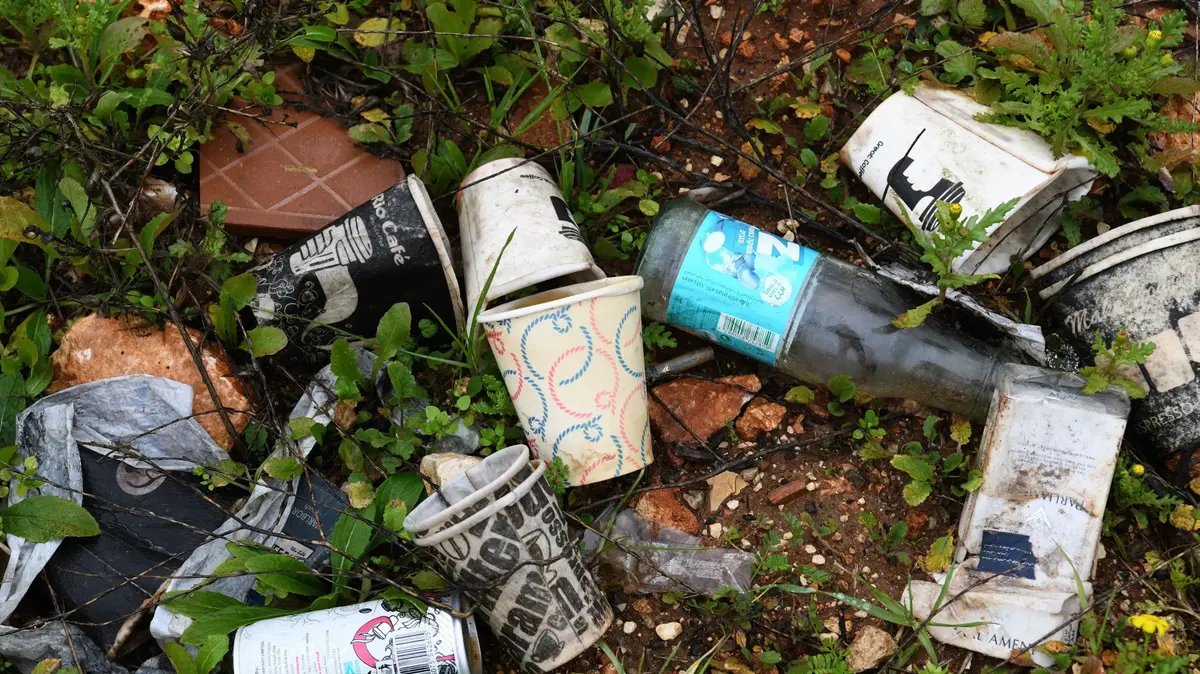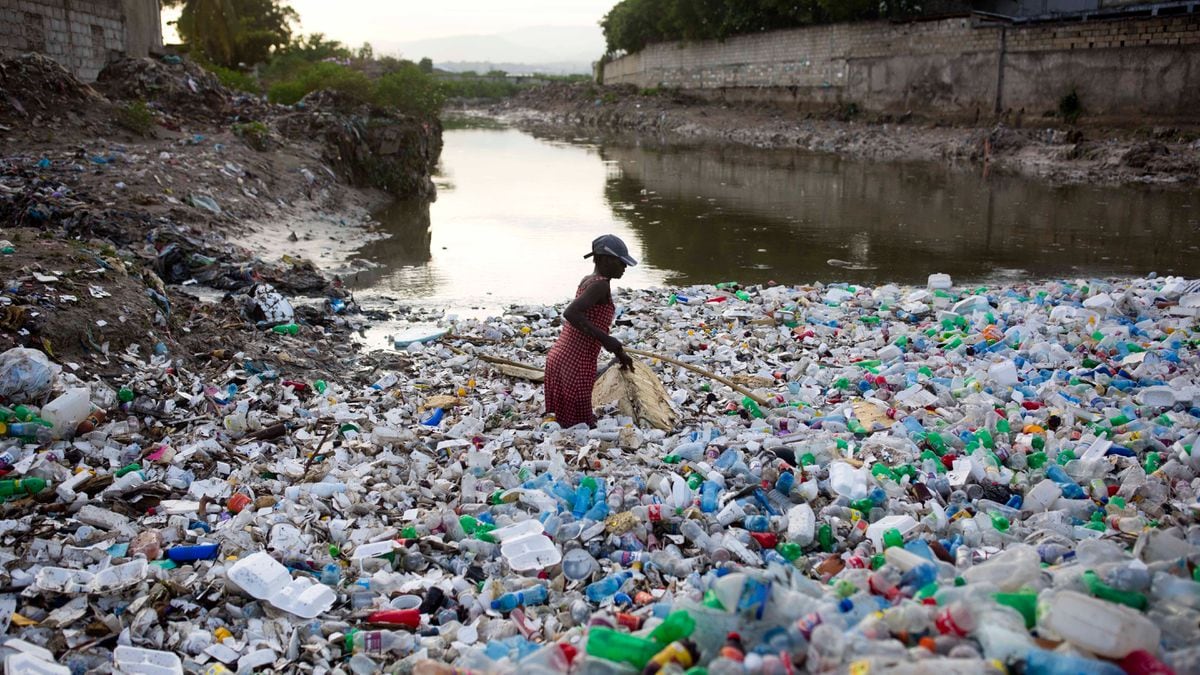7 things you did not know about the ecological price of a disposable
The air, the environment, the forests that surround us and also our health - all suffer from the amount of disposable utensils and plastics that fill the world and cause much destruction.
Here are some important things that everyone should know
In collaboration with the JNF
14/04/2022
Thursday, 14 April 2022, 07:43
Share on Facebook
Share on WhatsApp
Share on Twitter
Share on Email
Share on general
Comments
Comments
Not going anywhere.
Garbage left by hikers in the forest (Photo: Reuven Castro)
In the last year everyone has been talking about the monetary price of disposable plastic utensils that have gone up significantly, but money is perhaps the small price we pay for using these utensils.
Whether you use them at home, and especially perhaps on trips, these tools not only get dirty, but they leave a mark of ecological damage to the sea, forests, air and the whole environment that will take us many years to repair, if at all.
This is why the JNF, which deals with land development in Israel, forestry, river restoration and of course preserving the environment and instilling the values of ecology in Israel, works to remove the disposable utensils from the forests. Important and disturbing about using disposable tools that you probably did not know about.
Good to know (promoted)
Defeat the pain without fear: B-Cure laser in an unprecedented trial operation
Served on behalf of Bee Cure Laser
Plastic never disappears
Plastic is a material that can last forever, and yet 33 percent of all plastic we use daily - like water bottles, bags and straws - is used by us only once and thrown away.
Not only is the plastic non-perishable it also breaks down into smaller and smaller pieces (microplastics) so discarded plastic materials can stay around for up to 2,000 years or more.
What actually happens is that the disposable plastic utensils pile up (even if you throw them in the trash) and they do not decompose but accumulate in the ground.
Worse, when these tools are not thrown in the trash they pile up and accumulate, mainly in the sea but also in the forests that we use for hiking among other things, but mainly help to delay climate change and cool the environment.
This is one of the reasons why the JNF, which mainly does forestry, water and soil, preserves the green lungs of the environment, through forest conservation, forest tree improvement, forest planning and development, forest and ecological research, health and forest protection and of course forest protection from fires.
The real price is paid by the environment.
Disposable dishes (Photo: Reuven Castro)
Plastic poisons the sea
According to studies conducted for the European Union, plastic makes up about 90 percent of marine waste and about 10 million tons of plastic find their way to the ocean every year.
Even plankton, the tiniest creatures in our oceans, eat microplastics and absorb their dangerous chemicals.
The tiny, crumbling pieces of plastic bypass the algae needed to sustain a larger marine life that feeds on them.
And if you thought it ended up in plankton, you'm wrong, because microplastics have been found in more than 100 marine species.
And yes, that includes the fish we eat.
Plastic threatens wildlife
Not only the fish in the oceans are at real risk.
Wildlife found in forests can also be affected by the increasing use of plastic and the lack of protection of the environment.
Wild animals get entangled in plastic, they eat it or mistakenly think it is food and feed it to their young.
In fact more than 260 species, including invertebrates, turtles, fish, seabirds and mammals, are swallowed or entangled in plastic fragments, causing damage to movement and feeding, reduced reproductive output, digestive problems and even death in some cases.
In order to rehabilitate some of the affected wildlife, the Wildlife Climate Center in the Hula-KKL-JNF was established.
Plastic affects human health
Toxic chemicals leak from plastic and are found in the blood and tissues of almost all of us.
Exposure to them is associated with cancers, birth defects, defective immune systems, endocrine disorders and other diseases.
Two broad groups of plastic-related chemicals are of critical importance to human health - bisphenol A or BPA and phthalates - chemical compounds found in detergents, hygiene and plastic packaging.
These substances have been found in studies to cause infertility and sexual problems, breathing problems and even developmental delay.
Children in the Shachariya Forest (Photo: Avi Balavan, JNF)
By 2030, the amount of plastic in the world will double
Since the beginning of mass use of plastic in the middle of the 20th century, the amount of plastic produced each year has only been increasing.
In 2016, 320 million tons of plastic were produced worldwide, in 2019 the numbers have already exceeded 360 million tons of plastic - about the weight of the entire world population approximately, and by 2030 it is estimated that the amount will double.
Israel is the second in the world to consume disposable utensils
Despite the small size of Israel, the data on the use of disposable utensils in the country are among the highest in the world.
In fact, Israel is the second largest consumer in the world in the amount of disposable
utensils after the United States, and while in the world of pollution on beaches originating from plastic is about 58 percent, in Israel it is over 90 percent.
In a year, when in the last decade household consumption of disposable utensils has doubled.
Ilanot Forest (Photo: Bonnie Sheinman, JNF)
There is an alternative
It started with the "bags law" and then doubled the price of disposable products, but Israel is still a generation away from other countries that have already declared the use of disposables as prohibited in areas like beaches and forests.
But it seems clear to everyone that the solution to stopping the contamination of the plastic is simply in stopping its production.
Until that happens there are quite a few substitutes for disposable utensils and plastic bags that contaminate the land and sea.
Among other things, it is recommended to switch to reusable bags, or to use disposable utensils made of bamboo or coconut and biodegradable bags of corn starch (yes, there is such a thing) that disintegrate and do not leave a dangerous ecological mark, for us and the environment.
Still - the best alternative is to simply stop using disposable products and switch to reusable before our seas and forests are drowned in plastic.
Until that happens, on the Passover holiday, when you go out to spend time in the forests, take dishes with you many times and make sure they are clean
.
Guarding the Earth
Tags
Disposable dishes
Plastic
around the
Forests
wild animals
JNF














